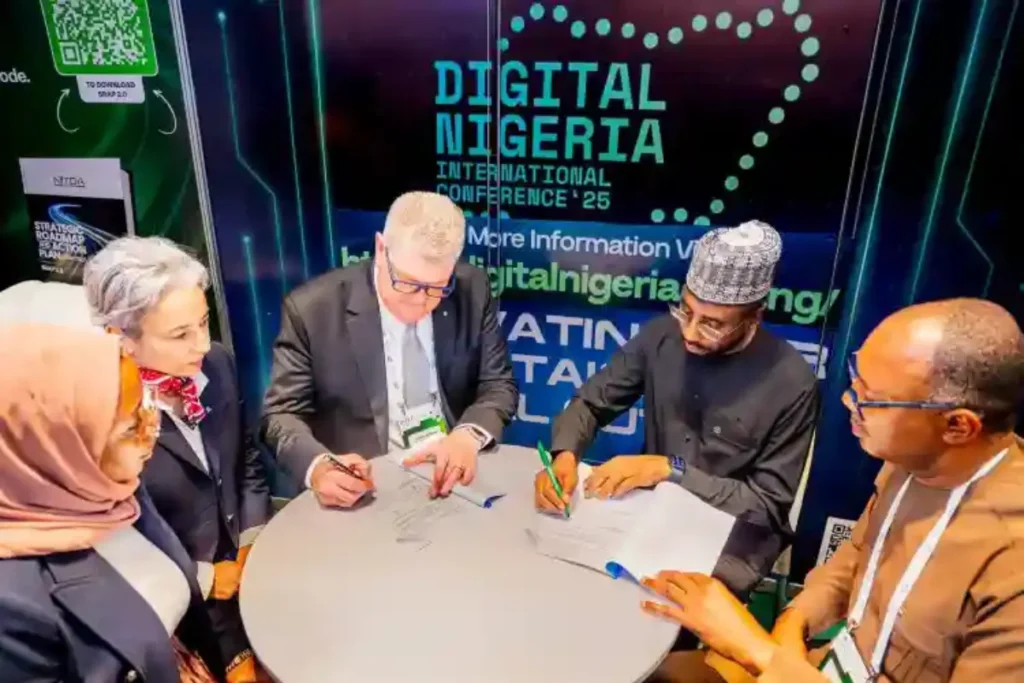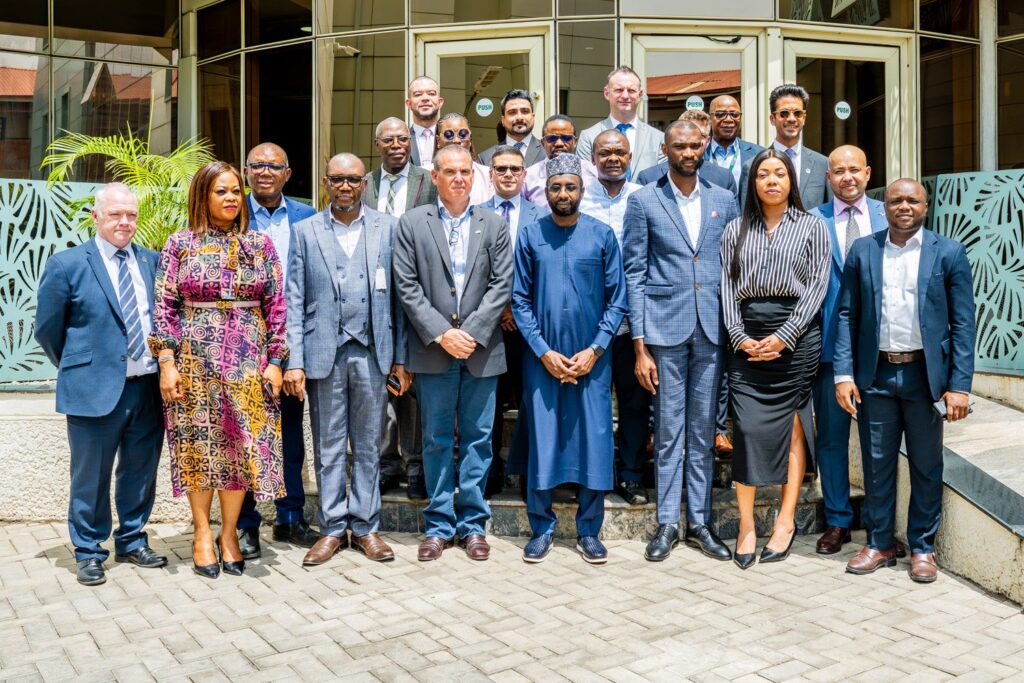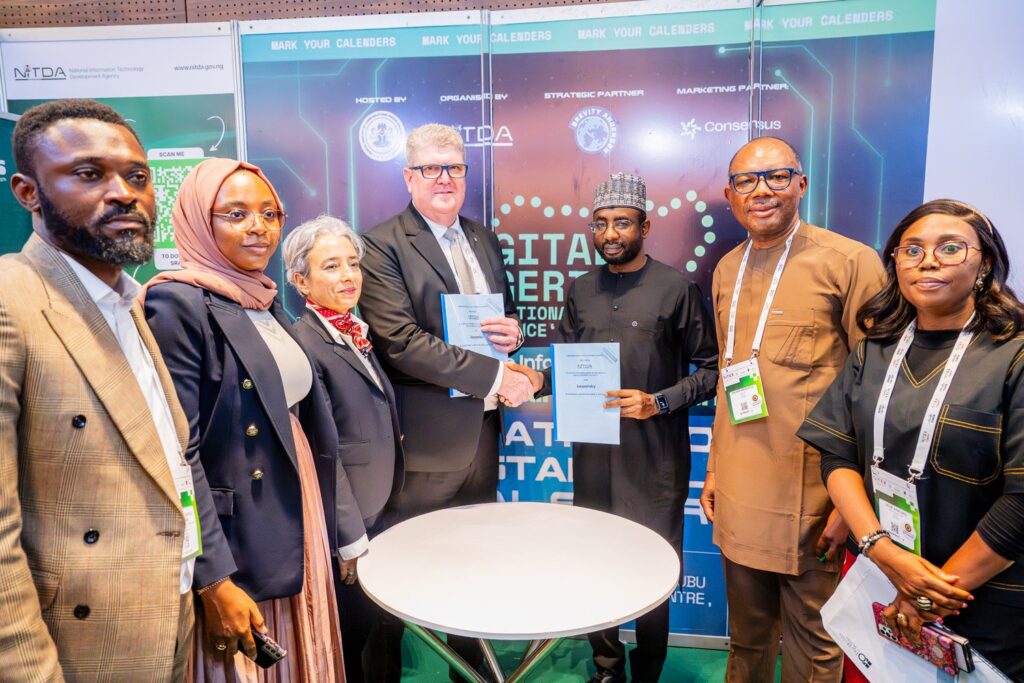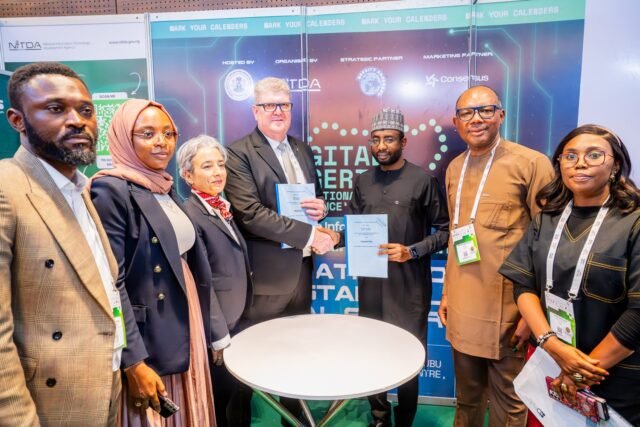At the bustling halls of GITEX Nigeria 2025, a new alliance quietly reshaped the country’s digital story. Kaspersky, one of the world’s leading cybersecurity firms, and NITDA (National Information Technology Development Agency of Nigeria) signed a landmark Memorandum of Understanding (MoU). The deal was more than ceremonial—it was a bold statement that Nigeria is determined to defend its cyberspace, nurture local expertise, and strengthen trust in a digital economy where every transaction, click, and login counts.
Cybersecurity is no longer an abstract concept; it is a pressing national concern. From online fraud targeting everyday citizens to sophisticated attacks on government databases and banks, Nigeria has seen how digital weaknesses can threaten economic growth and even national security. Against this backdrop, the partnership promises to provide not just technology, but also the knowledge, skills, and frameworks needed to make the country more resilient.

Table of Contents
Four Pillars that Define Kaspersky and NITDA Partnership
The Kaspersky–NITDA collaboration is structured around four practical pillars designed to bring impact beyond boardrooms.
1. Information and Threat Intelligence Sharing
Kaspersky will share global and regional intelligence about emerging threats, malware campaigns, and targeted attacks with NITDA. This ensures Nigerian agencies, businesses, and individuals have access to timely alerts and defences. In cybersecurity, information is power—and this flow of intelligence could save countless organisations from breaches.
2. Training and Capacity Building
A major highlight of the MoU is the commitment to upskill Nigerian professionals. This includes practical training in malware analysis, digital forensics, and incident response. Rather than relying solely on foreign consultants, Nigeria is building its own army of cyber defenders—an approach that secures the future.
3. Public Awareness and Digital Literacy
Recognising that over 90% of cyber incidents are triggered by human error, the deal will also focus on public campaigns. One standout initiative is the Cybersecurity Alphabet, an engaging way to teach families and children simple safety rules. From creating strong passwords to avoiding suspicious links, the programme translates complex ideas into fun, memorable lessons.
4. Safeguarding Critical Infrastructure
Beyond individuals, the partnership will advise on protecting vital digital systems—from power grids to healthcare records—that sustain national life. These infrastructures are prime targets for cybercriminals and state-sponsored attackers. A stronger defence means greater national stability.
Together, these pillars lay the groundwork for a safer digital environment where businesses can thrive and citizens can trust online services.
Voices from the Ceremony
At the signing, both sides delivered messages that resonated with urgency and hope.
Mallam Kashifu Inuwa, NITDA’s Director-General, reminded Nigerians that cybersecurity is not just about firewalls and software, but about people. He noted that the human factor remains the weakest link: “More than 95% of cyber breaches happen because of human mistakes. We must train, we must educate, and we must remain vigilant.” For him, the MoU is not a press release to be archived—it is a “springboard for action.”
On the other side, Chris Norton, General Manager for Africa at Kaspersky, took a broader view. He said Africa’s digital growth is immense, but to unlock it, capacity must be prioritised: “Africa doesn’t need charity. What Africa needs is skills.” His words cut to the heart of the partnership—helping Nigeria create value through knowledge, not dependency. Norton also hinted at deeper collaborations with Nigerian universities, tech hubs, and professional associations, ensuring the effort spreads across the ecosystem.
The honesty in their remarks struck a chord: both leaders admitted the challenges are real, but also emphasised that progress is only possible if everyone—from government to families—plays a role.

Why Kaspersky and NITDA Partnership Matters Now
This MoU lands at a decisive moment in Nigeria’s digital journey.
The Growth of Digital Services
Mobile banking, e-government services, online learning, and e-commerce are booming. But every digital advance is a new target for hackers. Without strong security, innovation stalls. Nigerians need confidence that their online activities are safe.
The National Agenda
Cybersecurity is one of the pillars of NITDA’s Strategic Roadmap and Action Plan (SRAP 2.0), which itself feeds into President Tinubu’s Renewed Hope Agenda. The Kaspersky partnership directly reinforces these goals, particularly the focus on strengthening cybersecurity and digital trust.
The Human Element
It’s not just about technology. With millions of Nigerians using smartphones as their primary connection to the internet, educating people about safe online behaviour is as crucial as deploying sophisticated tools. From phishing scams on WhatsApp to fake investment websites, cybercriminals often exploit human psychology more than they exploit computer code.
Global Expertise Meets Local Realities
Kaspersky has experience working with INTERPOL, AFRIPOL, and CERTs worldwide. Nigeria, however, has its unique realities—large informal markets, uneven internet access, and diverse cultural dynamics. By combining global know-how with local insight, this partnership is positioned to create strategies that truly work for Nigeria, not just copy-paste solutions from abroad.
The Road Ahead: From Paper to Practice
The true test of any MoU is not in the signing, but in the execution. NITDA and Kaspersky have already mapped out near-term deliverables. These include training workshops for Nigerian IT officers, the rollout of the Cybersecurity Alphabet to schools, and the establishment of a clear information-sharing protocol for tracking threats.
Measuring Success
NITDA has promised transparency and accountability. Success will not be measured by press releases, but by how many professionals are trained, how many agencies adopt new standards, and how many ordinary Nigerians feel more confident online.
Economic Implications
A secure cyberspace encourages foreign investment and boosts the digital economy. International companies are more likely to set up operations if they trust that Nigeria can protect sensitive data. Locally, startups and SMEs will also benefit from safer platforms to grow.
Building a Culture of Security
Perhaps the most lasting impact will be cultural. If Nigerians begin to see cybersecurity as part of everyday life—like locking your doors at night—then the country will have achieved a deeper kind of resilience. Laws and technologies matter, but it is people’s attitudes that ultimately decide whether a society is secure or vulnerable.

Conclusion: Anchoring Nigeria’s Digital Future in Trust
The partnership between Kaspersky and NITDA is more than a deal between a global company and a national agency. It is a recognition that Nigeria’s digital future must be anchored in trust, skills, and awareness. By focusing on intelligence sharing, training, public education, and infrastructure protection, the alliance touches every level of society.
As Nigeria races towards becoming a fully digital economy, the MoU is a reminder that progress must be matched with protection. Citizens, businesses, and government all stand to benefit from a safer cyberspace. The work ahead is challenging, but this collaboration is a crucial step in making Nigeria not just a participant, but a leader in Africa’s cybersecurity future.
Join Our Social Media Channels:
WhatsApp: NaijaEyes
Facebook: NaijaEyes
Twitter: NaijaEyes
Instagram: NaijaEyes
TikTok: NaijaEyes














![Tiwa Savage Slams ‘Unfair’ Exclusion of Tems from Afrobeats Big 3 Ranking [VIDEO] Tiwa Savage](https://naijaeyesblog.com/wp-content/uploads/2025/09/Tiwa-Savage-tems-180x135.avif)
























